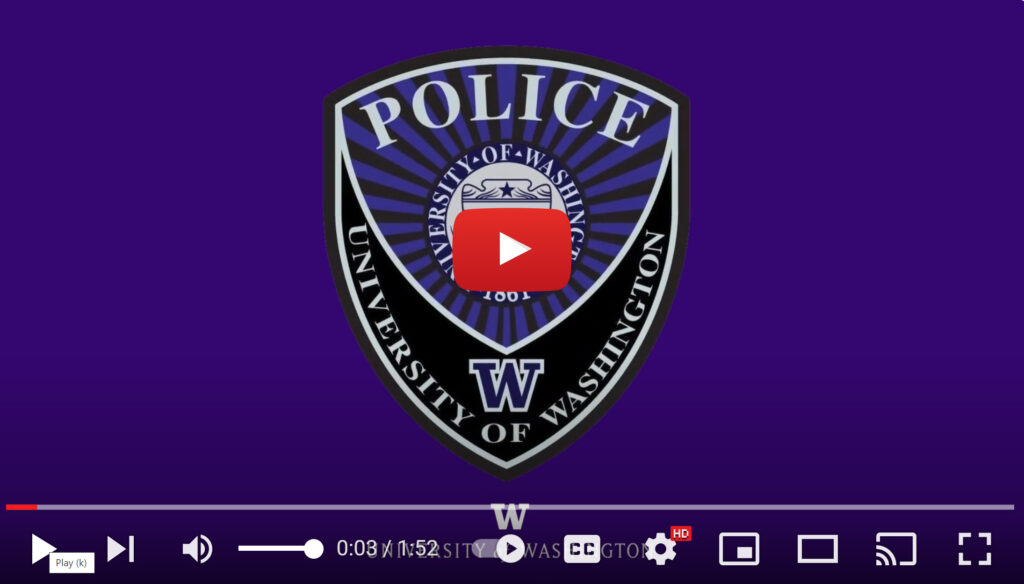
You get a call from a law enforcement agency, and the caller says you’re in trouble. If you don’t pay, you’ll be arrested. Sounds scary, and it’s tough not to immediately react. But pausing and verifying the information can keep you from becoming a victim of a scam.
We’ve heard recently from an increasing number of UW students, especially international students, that they’ve been targeted by scammers. The FBI’s Washington field office is also warning of scams targeting Chinese communities in the United States.
These hoaxes are not new but they are constantly being adapted in order to better target the personal and financial information of members of the UW community.
How to avoid a scam
UW’s Office of Information Security encourages you to stay aware and protect your UW NetID login and credentials.
Additional tips from the Federal Trade Commission to avoid a scam.
- Block unwanted calls and text messages. Take steps to block unwanted calls and to filter unwanted text messages.
- Don’t give your personal or financial information in response to a request that you didn’t expect. Honest organizations won’t call, email or text to ask for your personal information, like your Social Security, bank account or credit card numbers.
- If you get an email or text message from a company you do business with and you think it’s real, it’s still best not to click on any links. Instead, contact them using a website you know is trustworthy. Or look up their phone number. Don’t call a number they gave you or the number from your caller ID.
- Resist the pressure to act immediately. Honest businesses will give you time to make a decision. Anyone who pressures you to pay or give them your personal information is a scammer.
- Know how scammers tell you to pay. Never pay someone who insists that you can only pay with cryptocurrency, a wire transfer service like Western Union or MoneyGram, a payment app or a gift card. And never deposit a check and send money back to someone.
- Stop and talk to someone you trust. Before you do anything else, tell someone — a friend, a family member, a neighbor — what happened. Talking about it could help you realize it’s a scam. You can also call the UWPD’s non-emergency line at 206-685-8973.
Recent scams
Scam 1: You’re accused of committing a crime
The caller pretends to be from a police station, border and customs agency or post office. The caller claims they received illegal documents or items under the student’s name, therefore, proving the student had committed illegal acts. The caller then transfers the call from one pretended authority to another, not allowing the student time to think or verify. These calls always involve demanding the student to pay a bail, to provide identification or bank account information or to install Skype for further control of students’ daily life. The caller may also threaten to deport the student from the United States.
The caller(s) also demand the student keep everything confidential, telling the student not to tell their friends, school or parents.
We’ve also heard about calls to students’ cell phones with the caller number showing as 8696110, pretending to be China’s National Anti-Scam Center. The caller informs the student that they have been involved in major criminal cases such as money laundering due to theft of identity information and using forged official documents. Once the caller gains the victim’s trust, the scammer then tricks the victim into transferring money.
In these situations, hang up the phone, block the caller and call the University of Washington Police Department’s non-emergency number at 206-685-8973. Do not share any personal information with the caller. Please also report any threats to your safety. The scammers are most likely not calling from the United States and are trying to steal your money, not physically harm you.
Scam 2: Text messages asking for payment or clicking a link
This scam involves fake text messages from delivery companies, post office, bank or a government office asking you to click on a link so you can provide your credit information to pay delivery fees, bank fees or another kind of fee.
In these cases, do NOT click any links. This will avoid software crawling into your phone giving the scammers access to information stored on your phone. We recommend you block the sender.
Scam 3: Emails or calls from a fake government agency demanding payment
In this scam, students receive official-looking emails or phone calls that look like an official government agency, such as the Internal Revenue Service (IRS) or Chinese Consulate in San Francisco. These emails or phone calls typically lead to pressure on the student to pay money or threats to deport the student if they don’t pay.
In this case, don’t answer the call and block the sender. If you do answer, hang up. Keep in mind, any official agencies, like universities, the police, embassies/consulates, the IRS or immigration agencies, will NOT call you directly to discuss official business or require payments. In the United States, emails and postal mails are the most common forms of official communication.
Scam 4: Emails offering remote jobs with a good salary
In this scam, students receive job offers via email that allow them to work remotely and earn a good salary. One student was offered a job and was then asked to purchase some office supplies or gift cards, being promised to get reimbursed later. It was a scam. In these situations, report the scam to UWPD at 206-685-8973 or UWIT at help@uw.edu.
Learn more about job and loan scams from UW’s Office of Information Security.
Wondering if something is a scam? Contact UWPD!
We are here to help. If someone is threatening you and demanding money or making an offer that sounds too good to be true, please contact us at 206-685-8973.
 When the weather warms up — we’re pretty sure that will happen someday — more UW students, faculty and staff enjoy commuting and exploring the campus by bike. Unfortunately, that usually means that the number of bike thefts grows, too.
When the weather warms up — we’re pretty sure that will happen someday — more UW students, faculty and staff enjoy commuting and exploring the campus by bike. Unfortunately, that usually means that the number of bike thefts grows, too.
